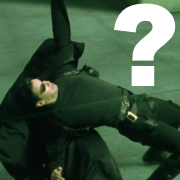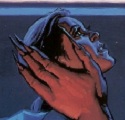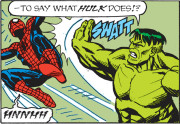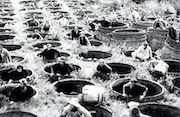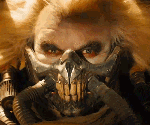|
JediTalentAgent posted:
A movie about the one Klingon nerd would be pretty hilarious. On Kronos in the beginning of the film heès wimpy, weak-willed and dishonorable. When he finally returns after his stay on Earth, heès realized that he can be strong, confident and honorable while still pursuing his dream of getting his degree in Starship design.
|
|
|
|

|
| # ? May 2, 2024 03:42 |
|
I'm not going to tag this. It's really weird reading all the complaints about references to Wrath Of Khan, and "why did Khan have to be in it???" when Into Darkness serves as a critique of that specific film and its place in the series. Star Trek 2009 was a bold rejection of Trek at its worst, the villain being a personification of the TNG films' idiocy. While Star Trek 2009 is the stronger film, Into Darkness takes on the more ambitious and nuanced task of criticizing Star Trek at its best - by rejecting attitudes that have been present in Trek from the beginning. It's attacking the dark core of Trek - the (for lack of a better term) 'grittiness' brought to the fore by Wrath Of Khan's naval warfare narrative. Nero was garbage from the prior future, but the Vengeance is garbage from the past. This is the vital importance of the spaceship models on display: the USS Vengeance is shown to be in the direct lineage of First Contact and Enterprise. Into Darkness admits that, despite the reboot, this prequel stuff is still 'canon', and that it sucks. It's the remnants of the old franchise that have yet to be exorcised. And Wrath Of Khan was the turning point that led to these gritty prequels. After Trek 2009 came out, and fans clamoured for a sequel, Abrams announced that they were in the process of choosing which direction to take the series: either a Wrath Of Khan-style conflict or an exploration narrative about sentient gas clouds and whatever. Rather than settling on one or the other, Into Darkness illustrates the process behind the choice. It bids farewell to Wrath Of Khan so that they can stop remaking it with every film. Genetic supermen do not exist. Khan is a metaphorical character. There's a reason he lies dormant, and continues to lie dormant at the end. The warehouse full of frozen dudes is a Indiana Jones reference - to the Lost Ark in its crate. Khan is pretty much the wrath of god, with his fury and savagery. He is (and, by extension, the militarism of Wrath Of Khan is) presented is something latent within the series - and within Kirk himself (hence the hard cut from Khan being knocked unconscious to Kirk waking up). Khan is implicitly analogous to the monster that Kirk unthinkingly shoots in the microcosmic opening sequence. "You just stunned our ride!" Khan is the dangerous animal that Kirk needs to control, rather than simply destroy. And, as a sidenote: the 'primitive natives' are made analogous to the terrified onlookers in San Francisco, which hopefully dispels concerns over racist imagery there. (The Volcano is, of course, the Vengeance's crash). So the 'happy ending' is not tacked on at all. It's a vital part of the story, designed to mirror the opening sequence - showing that the characters have come to peace with Khan and are moving into a future unburdened by the past. Into Darkness says that, unlike First Contact and Enterprise, Wrath is a very good film - but it's one whose impact is too overbearing. In a form-meets-function way, the narrative thread with the space-muslim Klingons is left hanging. How will the characters address the looming conflict? The only hope is that Kirk's got a little Khan in him now. Earlier in the thread, it was noted that the regenerative blood makes Khan into something of an Evil Jesus figure. This is exactly correct: Khan is one of Zizek's 'diabolical' revolutionary figures, who acts to reshape society out of a violent love that cuts across all segments. Khan, in this film, is pretty much the same character as Bane in Dark Knight 3: an inhuman force for good, up to the point that he becomes "human, all too human" and betrays himself. In this film, it happens when Khan is revealed to be fighting for his particular group of individuals and not any universal justice ideal. He specifically fails to make the leap from 'this shouldn't happen to us' to 'this shouldn't happen to anyone,' which is why Kirk must pick up where he left off. I think the film suffers a bit from veering close to the Iron Man series' 'bad egg' brand of anti-capitalism (i.e. blaming Admiral Marcus for widespread systemic problems) but saves itself by making 'Private Security' into the new redshirt. The USS Vengeance was evidently created in secret by private contractors, and Marcus is just a figurehead/patsy. SuperMechagodzilla fucked around with this message at 09:48 on May 23, 2013 |
|
|
|
Must we?
|
|
|
|
ChronoReverse posted:Incidentally, there was this crewman that had this implant thing on the back of his head and spoke with a weird voice. Does this timeline have androids already? IMHO, that was probably an early showing of a Binar.
|
|
|
|
Your Dead Gay Son posted:Really though, most of the junk gets a free pass in my book just because of the first scene on ST09 when crew gets sucked into the vacuum and the soundtrack went dead silent. All in all, I think STID is better than ST09, mostly because it's not doing time travel, the villain is a lot better, and the story isn't as lame, but the first scene of ST09, Kirk's birth, is flat-out perfect in every respect and nothing in STID (and not much from the old movies) can touch it.
|
|
|
|
I liked how Buckaroo Banzai revealed Section 31 to troublemaker Kirk and report everything Spock. This is probably going to lead to a temporal incident.
|
|
|
|
Improbable Lobster posted:A movie about the one Klingon nerd would be pretty hilarious. On Kronos in the beginning of the film heès wimpy, weak-willed and dishonorable. When he finally returns after his stay on Earth, heès realized that he can be strong, confident and honorable while still pursuing his dream of getting his degree in Starship design. I could see where there could be some humor in it, but imagine Cumberbatch playing Harrison as someone who is a Klingon version of a psychopath. He's physically weaker than a normal Klingon, but more than that he's an outcast in his mental state, as well. He's got something going on mentally that makes him more dangerous than they could ever dream of being. His 'unnatural' emotional states make him a better candidate than others to mimic what they see as the unfocused human mental condition. Similarly, perhaps training to make him more easily pass as human only further serves to alienate him more. It could be interesting that perhaps he comes to actually find the Federation the 'better' society, the one he actually has a chance of feeling normal in, but he's a Klingon, and he must deny himself to fulfill his Klingon honor; taking no pleasure from destroying Starfleet, but at the same time neither hesitating or retreating from doing so to the fullest of his ability. Edit: or just make Cumberbatch play a younger Koloth, Kor or Kang in this timeline where Klingons are still in their TOS mode. edit2: Or just have him play a very young Chang in his early career with both eyes. It could give him a chance to quote Shakespeare, be cunning and devious, and given how that character had more subtle Klingon feature we could sort of tone them down a bit more on Cumber-Chan. I think this would have probably been the better turn with the actor and the part. Chang isn't the icon that his real character is, but he's still a similarly well-respected enemy from the later parts of the TOS film franchise. JediTalentAgent fucked around with this message at 10:51 on May 23, 2013 |
|
|
|
Thank loving God we have you in this thread. I should have summoned you earlier. You really are the best.
|
|
|
|
This looks like it might be a good read however it seems like I need to finish half of other EU from the last 10 years first... http://www.thetrekcollective.com/2013/05/book-bits-new-ds9-wrath-of-khan-side.html
|
|
|
|
The thing that gets me is that Kirk and Spock have to look like Kirk and Spock. 60s bowl haircut and the like. Everyone is doing an impression of the original character. No one would be impressed with Karl Urban if he was doing a lovely Deforest Kelly, we love it cause he nailed those mannerisms. So if all that's ok why is ok to change Khan up much? I really liked the performance that was put out but it was so different then the original that I have a hard time seeing them as yhe same dude. If Harrison was his own villian movie would have been Solid as hell. Maybe if they had even explained who khan was in the movie I might have liked it more, really felt like the movie leaned on me the audience to already know who he was to set him up as a baddie then any dialog or action.
|
|
|
|
The Warszawa posted:
|
|
|
|
Strange Matter posted:I don't want to bring the thread back around to Race Trek again, but I just want to point out that this would have been awesome.
|
|
|
|
Cingulate posted:Katee Sackhoff as Kirk! She was a Stardoe not a Starbuck
|
|
|
|
Throb Robinson posted:The thing that gets me is that Kirk and Spock have to look like Kirk and Spock. 60s bowl haircut and the like. Everyone is doing an impression of the original character. No one would be impressed with Karl Urban if he was doing a lovely Deforest Kelly, we love it cause he nailed those mannerisms. So if all that's ok why is ok to change Khan up much? I really liked the performance that was put out but it was so different then the original that I have a hard time seeing them as yhe same dude. If Harrison was his own villian movie would have been Solid as hell. Maybe if they had even explained who khan was in the movie I might have liked it more, really felt like the movie leaned on me the audience to already know who he was to set him up as a baddie then any dialog or action.
|
|
|
|
This is from waaaay back in the thread, but I think Scotty in the New Trek serves as the connecting point to old Trek and Trek fans. In ST09, he's there getting lost in the cogs of this new machine that he doesn't understand by way of the brewery pipes. In STID, he's in Engineering firmly rejecting this massive payload of torpedos going "What is this poo poo, we don't NEED this, this is dangerous stuff to be messing with". And then the scenes of him running around in the Vengeance are funny because "God drat, this ship is stupid big", but it's echoing the pipes scene in 09 because it's an old familiar character once again running around lost in a big expanse of wasted potential.
|
|
|
|
SuperMechagodzilla posted:I think the film suffers a bit from veering close to the Iron Man series' 'bad egg' brand of anti-capitalism (i.e. blaming Admiral Marcus for widespread systemic problems) but saves itself by making 'Private Security' into the new redshirt. The USS Vengeance was evidently created in secret by private contractors, and Marcus is just a figurehead/patsy. If Khan is the 'diabolical revolutionary' (which is certainly an apt description, and comparison with Zizek's take on Bane), then the message the film gives us regarding the moral responsibility to seek a purer, cleaner capitalism is more insidious in STID. The whitewashing of Khan (and Bane) specifically inverts the expectation of the revolutionary figure as a nomadic war machine (the dangerous Other to the state), depicting instead an aspect of the liberal state that has been appropriated for its own use. In the past, Kirk would naturally assume for the villain to turn around to face the audience and of course be revealed as the foreign and dangerous Other (Khan as the Indian warlord, Bane as the Hispanic revolutionary felon) but instead finds some British dude in the same role (Batman, likewise, finds a British dude). That the identity of Khan has been appropriated by a British militant is fitting then, in this case. The danger isn't from the marauding foreign invaders, but how they have infected our good liberal state. Kirk's noble task is to excise this growth in the liberal state, a dangerous side effect of contact with and appropriation of the nomadic war machine (the liberal slippery-slope argument is of course always "but then we're no better than the terrorists!") in order to return to the purer, moral design of the Federation: nineteenth century colonialism. Why else would the heartfelt post 9-11 eulogy flow seamlessly into a return to the original series' colonialist project.
|
|
|
|
SuperMechagodzilla posted:Genetic supermen do not exist. Khan is a metaphorical character. There's a reason he lies dormant, and continues to lie dormant at the end. The warehouse full of frozen dudes is a Indiana Jones reference - to the Lost Ark in its crate. Khan is pretty much the wrath of god, with his fury and savagery. He is (and, by extension, the militarism of Wrath Of Khan is) presented is something latent within the series - and within Kirk himself (hence the hard cut from Khan being knocked unconscious to Kirk waking up). I think the Khan-ness of everything after Star Trek II was predicated on a total misunderstanding of WoK's "militarism." They mistake the actions of the Enterprise in WoK as a necessity when really, it's presented as a bunch of random, terrible suffering. Kirk is old as poo poo and he learns a bunch of hard-rear end lessons about how the way he lives his life is completely unsustainable and harms everyone and everything around him. Post-Khan films think that WoK's success is based on the potency of its theme of vengeance, which is good stuff, but Kirk's very serious, practically un-fun character arc about what a loser he is is why it's a classic. So basically, I think I agree with what you're saying, and I certainly hope it winds up being a book-closer on this gross misinterpretation that has led to a lot of crappy Star Trek movies. But I'm skeptical.
|
|
|
|
Danger posted:If Khan is the 'diabolical revolutionary' (which is certainly an apt description, and comparison with Zizek's take on Bane), then the message the film gives us regarding the moral responsibility to seek a purer, cleaner capitalism is more insidious in STID. The whitewashing of Khan (and Bane) specifically inverts the expectation of the revolutionary figure as a nomadic war machine (the dangerous Other to the state), depicting instead an aspect of the liberal state that has been appropriated for its own use.
|
|
|
|
Strange Matter posted:It's a little unfair to describe the original theme of Star Trek to be colonialism when the ideal Roddenberry tried to espouse is discovery and discovery over exploitation. The whole reason for the Prime Directive is to prevent that kind of interference and to allow less developed cultures to evolve without spacemen coming down to impose their technology and ethical standards. Granted there are probably more instances of the Prime Directive being violated than of it being upheld, but it's always shown as having consequences. That's even the case in Into Darkness-- the Nibiruans or whatever make the Enterprise into their new cultural symbol, Kirk loses his command and Spock gets kicked off the ship. What a work tries to espouse and what it does espouse are entirely separate things. Almost all colonialism and imperialism has been justified, at some point, by the desire to explore.
|
|
|
|
I understand that whitewashing is bad and that minorities need to be actively represented in the media. I'm a little surprised how important it is to people what race the villains are... I would have thought that villains being minorities was a pretty common thing in hollywood, what with fear of the other and alien culture. Even honorable and strong villains are often romanticized or exocticized members of other cultures. I think it's interesting how (spoilers for both star trek and Iron man 3) there are people in the IM3 thread complaining the The Mandarine wasn't a romanticized asian or middle-eastern steriotype BECAUSE THEY THOUGHT HE WAS MORE THREATENING THAT WAY, while here in the STID thead people are complaining that Khan wasn't romanticized Sikh Warrior because they think of him as a role-model? The most important thing about an antagonist is they are a fitting antagonist to the heroes. This is why villains are re-imagined more often than heroes: because they need to stay relevant. Can you imagine the blowback if Khan was ethnically from India and was portrayed as warlord and a terrorist? There are people right now in america who want to nuke Pakistan (And please don't say that I am saying Pakistanis are the same as Indians, I'm talking about what it would look like to the average american), and having Khan be middle-eastern or Indian despotic madman is hardly a good implication for anyone. When I thought for a second that Khan was actually teaming up with Kirk and they were going to be buddies, I thought it was pretty bad that he was white, because whitewashing heroes is bad, but villains exists solely to reflect the inner conflicts of the protagonist./spoiler] There has been a large amount of "whitewashing" villains recently, just of the top of my head: [spoiler]Ras Al Guul, Bane, The Mandarin, and Khan and this isn't because we just want more white people in movies, its because (and I can't believe I'm about to say this) hollywood has matured ever-so-slightly to the point where we don't need these characters to be "the other" anymore, and want them to reflect the dark natures of OUR society rather than the darkness of other cultures.
|
|
|
|
Strange Matter posted:It's a little unfair to describe the original theme of Star Trek to be colonialism when the ideal Roddenberry tried to espouse is discovery and discovery over exploitation. The whole reason for the Prime Directive is to prevent that kind of interference and to allow less developed cultures to evolve without spacemen coming down to impose their technology and ethical standards. Granted there are probably more instances of the Prime Directive being violated than of it being upheld, but it's always shown as having consequences. That's even the case in Into Darkness-- the Nibiruans or whatever make the Enterprise into their new cultural symbol, Kirk loses his command and Spock gets kicked off the ship. Star Trek, at it's basic premise, is explicitly colonialist. The franchise shows how it never ends with discovery, and that the act of discovery is itself appropriation. The oft quote that frames virtually every "Star Trek" story: quote:Space... the Final Frontier. These are the continuing voyages of the starship Enterprise. Her ongoing mission: to explore strange new worlds, to seek out new life forms and new civilizations, to boldly go where no man has gone before.
|
|
|
|
Snak posted:I understand that whitewashing is bad and that minorities need to be actively represented in the media. I'm a little surprised how important it is to people what race the villains are... I would have thought that villains being minorities was a pretty common thing in hollywood, what with fear of the other and alien culture. Even honorable and strong villains are often romanticized or exocticized members of other cultures. I think it's interesting how (spoilers for both star trek and Iron man 3) there are people in the IM3 thread complaining the The Mandarine wasn't a romanticized asian or middle-eastern steriotype BECAUSE THEY THOUGHT HE WAS MORE THREATENING THAT WAY, while here in the STID thead people are complaining that Khan wasn't romanticized Sikh Warrior because they think of him as a role-model? The most important thing about an antagonist is they are a fitting antagonist to the heroes. This is why villains are re-imagined more often than heroes: because they need to stay relevant. Can you imagine the blowback if Khan was ethnically from India and was portrayed as warlord and a terrorist? There are people right now in america who want to nuke Pakistan (And please don't say that I am saying Pakistanis are the same as Indians, I'm talking about what it would look like to the average american), and having Khan be middle-eastern or Indian despotic madman is hardly a good implication for anyone. When I thought for a second that Khan was actually teaming up with Kirk and they were going to be buddies, I thought it was pretty bad that he was white, because whitewashing heroes is bad, but villains exists solely to reflect the inner conflicts of the protagonist./spoiler] The problem is that this "sensitivity" in live-action media isn't at all (except for like, MAYBE Nick Fury, and even that's traceable to the comics) counterbalanced by, say, making previously white characters into characters of color. The other problem with this fake sensitivity is that it further narrows the available roles for actors of color and the portrayal of people of color. Also, I'm a little weirded out by the idea that villains can only be white in order to reflect the dark natures of, quote, "OUR society." Zoe Saldaña and John Cho are both more closely tied to the culture that gave rise to the foreign policy most aggressively interrogated (however clumsily) in the film than is Benedict Cumberbatch, and neither of them are white. "We" (who is this we you're talking about?) may not need the Foreign Other, but in this purported enlightenment, people of color - through characters and opportunities - are erased, and that's hosed up. You're also missing the point that Khan was portrayed that way - he was still textually Indian, they just whitewashed the casting. The implications of the text are probably part of why the Eugenics Wars background got brushed over. Khan was, ultimately, well-drawn in that he was doing bad poo poo for understandable reasons, so I think the problem of "implications" is less a reason and more an excuse.
|
|
|
|
Y'all are still ignoring the part of that post where he/she points out that every time the prime directive is violated the consequences are shown. I don't know how you can still classify Star Trek as colonial-imperialist. I mean...I guess you could argue that it's folly to think you could explore without having any impact but then you're just arguing against scientific progress and that everyone should just stay home.
|
|
|
|
Colonel Whitey posted:Y'all are still ignoring the part of that post where he/she points out that every time the prime directive is violated the consequences are shown. I don't know how you can still classify Star Trek as colonial-imperialist. I mean...I guess you could argue that it's folly to think you could explore without having any impact but then you're just arguing against scientific progress and that everyone should just stay home. Considering that the consequences of violating the Prime Directive are usually portrayed "altered path" versus "annihilation," I'd hesitate to say that the text is condemning violating the Prime Directive so much as saying "sometimes you've got to break a few eggs to make a United Federation of Planets."
|
|
|
|
Colonel Whitey posted:Y'all are still ignoring the part of that post where he/she points out that every time the prime directive is violated the consequences are shown. I don't know how you can still classify Star Trek as colonial-imperialist. I mean...I guess you could argue that it's folly to think you could explore without having any impact but then you're just arguing against scientific progress and that everyone should just stay home. What are the consequences in the film? Kirk was portrayed as doing the noble, human, thing and disregarded those regulations to save the primitive people which would have otherwise been wiped out if not for the help of the "explorers". Of course his mentor saw this in him and made sure that whatever punishment he faced was neutered, the federation needs folks like that. The original series is just blatant about it, perhaps giving some lip service to the notion while Kirk uses native populations to wage a proxy war against his enemies.
|
|
|
|
The Warszawa posted:Considering that the consequences of violating the Prime Directive are usually portrayed "altered path" versus "annihilation," I'd hesitate to say that the text is condemning violating the Prime Directive so much as saying "sometimes you've got to break a few eggs to make a United Federation of Planets." That last sentence is a really unfair way to characterize what's usually shown. They aren't trying to co-opt those cultures into the Federation, they're just protecting them from another outside threat. In STID what Kirk did wasn't protecting them from an outside threat but it was condemned; it was the setup for his character arc of learning humility. When Starfleet do reach out once they've determined the culture is technologically ready, they always give that culture the option of joining. I think you're kind of going out of your way to make it seem like something insidious when it's not.
|
|
|
|
Danger posted:What are the consequences in the film? Kirk was portrayed as doing the noble, human, thing and disregarded those regulations to save the primitive people which would have otherwise been wiped out if not for the help of the "explorers". Of course his mentor saw this in him and made sure that whatever punishment he faced was neutered, the federation needs folks like that. The original series is just blatant about it, perhaps giving some lip service to the notion while Kirk uses native populations to wage a proxy war against his enemies.
|
|
|
|
Danger posted:What are the consequences in the film? Kirk was portrayed as doing the noble, human, thing and disregarded those regulations to save the primitive people which would have otherwise been wiped out if not for the help of the "explorers". As a crass exaggerated real-world analogy, you're basically looking at the White Man's Burden here. Why leave these people alone? They NEED us! The movie is not making a fair case for leaving people to their own devices by facing them with a planet-destroying volcano. And this is how it very often is in the series, like when Data gets a pen pal from a pre-warp civilization threatened by earthquakes. Strange Matter posted:The consequences are that the Nibiruans discarded their old religion and now worship the Enterprise. Kirk irrevocably and overtly changed the course of their cultural evolution. For the most part Star Trek always considers the consequences of interfering with less developed cultures. Sometimes it benefits them, sometimes it screws up their cultural development, and sometimes it's abiguous or unknown because the timeline isn't explicitly shown.
|
|
|
|
Danger posted:What are the consequences in the film? Kirk was portrayed as doing the noble, human, thing and disregarded those regulations to save the primitive people which would have otherwise been wiped out if not for the help of the "explorers". Of course his mentor saw this in him and made sure that whatever punishment he faced was neutered, the federation needs folks like that. The original series is just blatant about it, perhaps giving some lip service to the notion while Kirk uses native populations to wage a proxy war against his enemies. There was no point in the film where that was portrayed as anything but a bad decision. This is reinforced when Kirk later sees what Spock was trying to do and sacrifices himself.
|
|
|
|
SuperMechagodzilla posted:I'm not going to tag this. Bra-vo. Way sum up what makes this movie worthwhile 
|
|
|
|
Colonel Whitey posted:That last sentence is a really unfair way to characterize what's usually shown. They aren't trying to co-opt those cultures into the Federation, they're just protecting them from another outside threat. Sounds like Colonialism to me!
|
|
|
|
Strange Matter posted:The consequences are that the Nibiruans discarded their old religion and now worship the Enterprise. Kirk irrevocably and overtly changed the course of their cultural evolution. For the most part Star Trek always considers the consequences of interfering with less developed cultures. Sometimes it benefits them, sometimes it screws up their cultural development, and sometimes it's abiguous or unknown because the timeline isn't explicitly shown. The spaceship carving is depicted as a final 'hah' moment, a necessary alteration to save the planet. And no matter the consequences, it is still an explicit colonialist depiction framed entirely from the moral view of the colonizers with no further regard for the depiction of subaltern populations beyond what important lesson the crew learns from this. edit: again, this is all personified in the crew's iconic mission: quote:Space... the Final Frontier. These are the continuing voyages of the starship Enterprise. Her ongoing mission: to explore strange new worlds, to seek out new life forms and new civilizations, to boldly go where no man has gone before. edit2: It's incredibly hard to argue that the Star Trek franchise, especially in it's original and iconic form, is not a depiction of liberal imperialism; and my original point wasn't that STID reproduces that exactly (though it recalls it fondly), but ultimately says that it is the more morally just endeavor than post-9/11 overtly militant imperialism ("we're becoming just like the terrorists, which means the terrorists won!"). SMG likened it to Iron Man's message of excising the subjective violence to maintain the objective. I'd suggest that it's more underhanded than Iron Man in that regard. Danger fucked around with this message at 20:28 on May 23, 2013 |
|
|
|
SuperMechagodzilla posted:The warehouse full of frozen dudes is a Indiana Jones reference - to the Lost Ark in its crate. I couldn't help but say "Top Men!" in the theater when that shot came up.
|
|
|
|
1st AD posted:Sounds like Colonialism to me! Wrong, it's a dilemma that has no analog in our history of colonialism. When I say outside threat, I mean some ill-intentioned alien being, as opposed to a natural disaster. I explained in my post above how in STID their interference in the natural disaster was condemned.
|
|
|
|
Colonel Whitey posted:Wrong, it's a dilemma that has no analog in our history of colonialism. When I say outside threat, I mean some ill-intentioned alien being, as opposed to a natural disaster. I explained in my post above how in STID their interference in the natural disaster was condemned. Yeah, look up the history of European competition over colonial holdings or even Monroe Doctrine and tell me how colonialism was never justified by protection from an "outside threat," like the French or the Belgians or any other imperial power. Hell, you can just look up American intervention in Cuba in the 19th and early 20th century to see it.
|
|
|
|
The Warszawa posted:Yeah, look up the history of European competition over colonial holdings or even Monroe Doctrine and tell me how colonialism was never justified by protection from an "outside threat," like the French or the Belgians or any other imperial power. Hell, you can just look up American intervention in Cuba in the 19th and early 20th century to see it. In a very general sense maybe but I don't see how any of those things are at all similar to anything portrayed in Star Trek.
|
|
|
|
So I was checking Memory Alpha for ole Khan, and apparently he ruled relatively bloodless and waged no expansionist wars, refuting Spocks accusation of him being a mass murderer. Interestingly there were also 84 pods mentioned in the original show, but 12 failed. Now apart from the fact I found the movie a mess, what the hell is up with Simon Pegg? He sounds like a caricature of a caricature of a Scot.
|
|
|
|
Riso posted:So I was checking Memory Alpha for ole Khan, and apparently he ruled relatively bloodless and waged no expansionist wars, refuting Spocks accusation of him being a mass murderer. He's not Scottish and is doing an accent, so that's what's up.
|
|
|
|
The Warszawa posted:He's not Scottish and is doing an accent, so that's what's up. He's English he should know better than to sound like that. James Doohan was Canadian and wasn't this annoying.
|
|
|
|

|
| # ? May 2, 2024 03:42 |
|
Jesus, life must be so horrifyingly boring and stressful for someone who cares so much about all this inconsequential garbage. I saw Into Darkness last week and am going back for seconds Sunday. It has some serious flaws and I'm liking it less the more I think about it, but it's one of the best action films in years. I avoided the 3D on my first viewing since it was terrible in Iron Man 3, but I hear it's great in STID so I'll probably go for it on my second watch. What did 3D viewers think of it? STID has a lot more CG than Iron Man 3, so maybe the action will look better. Plus JJ doesn't seem like one to half-rear end something like that.
|
|
|


